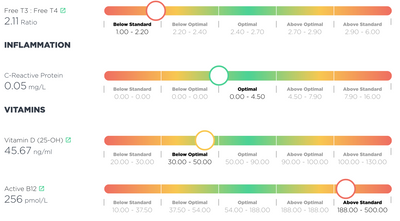
The Importance of Keeping Hydrated For Mind and Body
Overview
As you may know, our bodies mainly consist of water with dissolved minerals. We call these minerals electrolytes.
Electrolytes ensure a myriad of physiological functions, including nervous impulses, muscle contraction, maintaining proper hydration, and balancing pH levels
Maintaining the balance between water and electrolytes is a vital physiological process that falls under a concept known as homeostasis. The latter refers to the body’s tendency to restore balance to different physiological processes.
In this article, we will cover the benefits of drinking water then highlight the relationship between water and electrolytes.
The benefits of drinking water
Maximum physical performance
When you keep yourself hydrated, your physical performance gets optimized, especially during hot weather or exercise.
Never forget that dehydration is the number one enemy of athletes and gym-goers, as it causes fatigue, slow reflexes, and confused mental status.
Researchers already established the role of hydration in muscle contraction and performance.
Reduction in the frequency of headaches
Studies pinpointed low water reserves as a risk factor for migraines and headaches.
According to one study, adding 50.7 ounces (1.5 liters) of water to your daily consumption tempers down the severity of headaches the Migraine-Specific Quality of Life scale – a special scale used to estimate the severity of migraine headaches.
Improved digestion
Constipation is the direct result of poor water distribution inside the small intestines and colon.
Increasing your fluid intake is the most effective way to treat constipation and other symptoms of indigestion.
In fact, low water intake is a well-established risk factor for constipation in young and older individuals.
Reduction in the size of kidney stones
Kidney stones cause severe pain and compromise the flow of urine to the bladder.
When diagnosed with this condition, your doctor will undoubtedly recommend drinking large amounts of water to break down the stones.
Unsurprisingly, drinking enough water prevents kidney stones altogether.
When homeostasis goes rogue…
Similar to other systems in the body, fluid and electrolyte homeostasis is subject to disturbances that interfere with the optimal function of the cells.
When fluid is the primary defect, we will be dealing with dehydration (overhydration is relatively rare).
Let us now take a look at each entity:
Dehydration
Dehydration is a medical term that describes fluid imbalance in the body due to excessive loss of water or insufficient fluid intake.
The most common causes of dehydration include persistent vomiting, severe diarrhea, and profuse sweating.
Doctors categorize the severity of dehydration based on the amount of fluid lost, which corresponds clinically to the seriousness of signs and symptoms.
For instance, losing 5% of your total fluid will not be as severe as losing 15%.
The other factor that plays a role in the management plan is determining the type of dehydration, which can be intracellular, extracellular, or a combination of both.
Overall, dehydration is a subtle condition that takes hours or even days to become clinically relevant but yields substantial damage to the vast majority of organ systems if left untreated.
Risk factors of dehydration
Researchers have been able to identify several risk factors that increase the chances of dehydration, including prolonged exposure to the sun (e.g., cyclists, marathon runners), which triggers the sweat response that eventually evaporates excessive amounts of water.
Other athletes (e.g., swimmers, bodybuilders) are also prone to develop dehydration, which may seem odd at first. However, remember that sweating occurs to lower the body’s core temperature regardless of the external environment.
In other words, if you are running a marathon in the middle of July or playing table tennis in your home, the body will react in a similar way.
Other risk factors include:
- Advanced age (older adults)
- Young age (Infants and toddlers)
- Some careers (e.g., welders, landscapers, construction workers, mechanics)
- Chronic conditions (e.g., diarrhea, peptic ulcers, nephrotic syndrome)
- Living in a high-altitude area
What are electrolytes?
An electrolyte is an umbrella term that describes all particles with a negative or positive electric charge.
In the field of nutrition, electrolytes refer to essential minerals found in the blood, urine, and sweat.
The primary electrolytes found in the body are:
- Sodium
- Potassium
- Chloride
- Calcium
- Magnesium
- Phosphate
- Bicarbonate
The role of water in the human body
Water and electrolytes are absolutely vital for the human body for a variety of reasons.
Here are the main functions that water and electrolytes mediate:
Nervous system function
The brain relies on sending and receiving electrical signals to communicate with different cells splattered throughout the body.
Researchers refer to these signals as nervous impulses, which get generated by modifying the electrical charge of cell membranes.
To mediate these changes, the cell pushes sodium across its membrane, which leads to a cascade of reactions that end up changing the charge of the cell membrane.
Consequently, the nervous impulses temporarily turn into chemical interactions that once again launch new electrical signals.
Without water and electrolytes, this function would not be possible.
Muscle contraction
Calcium is the primary electrolyte that ensures muscle contraction.
By connecting with the actin-myosin complex, calcium sets the sliding motion of proteins, which translates into muscle contraction and movement.
Another important electrolyte for muscle contraction is magnesium.
Proper hydration
As mentioned above, water is kept under strict check to ensure that there is just the proper amount inside and outside cells.
Sodium, in particular, plays a major role in balancing fluid through a concept known as osmosis. This refers to the tendency of water to move through a cell membrane from a dilute (low concentration of electrolytes) to a more concentrated (high concentration of electrolytes) solution.
As a result of this fascinating system, the cells do not burst from overhydration, nor do they shrivel from dehydration.
pH levels
Internal pH is strictly regulated by the body to make sure that your cells are functioning properly.
pH is a measure that indicates how acidic or alkaline a milieu is. Every second, your body recruits a variety of mechanisms to keep the internal pH between 7.35 and 7.45.
Deviating from these values leads to cellular dysfunction, and in severe cases, death.
Fortunately, the integration of electrolytes in weak acids and bases prevents acid-base imbalances.
Takeaway message
Water and electrolytes are vital for the human body, and their homeostasis is a priority to maintain the proper function of different organ systems.
Hopefully, this article managed to shed some light on the importance of hydration and the role of electrolytes in the human body.



